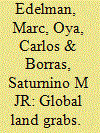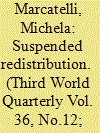| Srl | Item |
| 1 |
ID:
124908


|
|
|
|
|
| Publication |
2013.
|
| Summary/Abstract |
Scholars, practitioners and activists generally agree that investor interest in land has climbed sharply, although they differ about what to call this phenomenon and how to analyse it. This introduction discusses several contested definitional, conceptual, methodological and political issues in the land grab debate. The initial 'making sense' period drew sweeping conclusions from large databases, rapid-appraisal fieldwork and local case studies. Today research examines financialisation of land, 'water grabbing', 'green grabbing' and grabbing for industrial and urbanisation projects, and a substantial literature challenges key assumptions of the early discussion (the emphasis on foreign actors in Africa and on food and biofuels production, the claim that local populations are inevitably displaced or negatively affected). The authors in this collection, representing a diversity of approaches and backgrounds, argue the need to move beyond the basic questions of the 'making sense' period of the debate and share a common commitment to connecting analyses of contemporary land grabbing to its historical antecedents and legal contexts and to longstanding agrarian political economy questions concerning forms of dispossession and accumulation, the role of labour and the impediments to the development of capitalism in agriculture. They call for more rigorous grounding of claims about impacts, for scrutiny of failed projects and for (re)examination of the longue durée, social differentiation, the agency of contending social classes and forms of grassroots resistance as key elements shaping agrarian outcomes.
|
|
|
|
|
|
|
|
|
|
|
|
|
|
|
|
| 2 |
ID:
142657


|
|
|
|
|
| Summary/Abstract |
In this article I show how ideas and practices of ‘green economy’ can reproduce and even naturalise inequality in water access for local users. Evidence to support my argument is drawn from the Waterberg region in the Limpopo Province of South Africa. Following the demise of apartheid and the appeal of the green economy, the Waterberg has been ‘reinvented’ as a wildlife destination. Whereas game farms enjoy secure water supply, the rural poor relocated to the small town of Vaalwater suffer severe water shortages. The article questions the mainstream view according to which game farms have no relationship to the water problems in town. Rather, I suggest that by conceiving and managing water as a private commodity deriving from land ownership and largely unregulated by the state, green economy initiatives contribute both materially and discursively to hampering more equality in water redistribution.
|
|
|
|
|
|
|
|
|
|
|
|
|
|
|
|